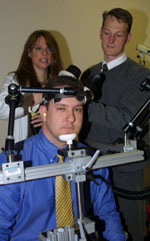Resident combines therapy, NASA research
by Cindy AbolePublic Relations
An innovative treatment under research by radiology resident Donna Robert, M.D., would use powerful magnets to help astronauts in space and bring hope to stroke and paralysis patients.
The MUSC alumnus and senior resident recently won a $516,000 jointly-funded NASA grant to study brain changes using a dynamic, non-invasive brain stimulation technique. Her research seeks a clearer understanding of the brain’s neural pathways with the intent of developing protocols for long-duration spaceflights.
Since the early days of manned spaceflight, NASA has studied changes to the human body’s muscular and skeletal structures, especially as astronauts were exposed to weightlessness. Using transcranial magnetic stimulation (TMS), Roberts and her colleagues will focus on the brain’s adaptive response within microgravity and planetary environments.
“In weightlessness, the brain gets rewired and learns to adjust to things in that environment,” said Roberts. “As an astronaut returns to earth, the brain learns to readjust and reorients to gravity.”
Roberts, who is finishing a prestigious five-year radiology research residency, worked and studied under research mentor Mark George, M.D., director of MUSC’s Brain Stimulation Lab and Center for Advanced Imaging Research. George has been successful in using TMS therapy for depression. He is now using TMS in studies on sleep deprivation and performance and other research.
 Radiology
resident Dr. Donna Roberts, along with medical students Scott Carroll and
Wayne Kelley, demonstrate TMS treatment as part of innovative research
she conducts on behalf of NASA. Roberts won a NASA research grant to study
the effects of weightlessness on the brain.
Radiology
resident Dr. Donna Roberts, along with medical students Scott Carroll and
Wayne Kelley, demonstrate TMS treatment as part of innovative research
she conducts on behalf of NASA. Roberts won a NASA research grant to study
the effects of weightlessness on the brain.
“Dr. Roberts is uniquely qualified to conduct this level of research,” George said. “She’s superlative in her work on brain imaging and has a great track record. She’s setting the stage for brain imaging research for NASA.”
Prior to her career in medicine, Roberts was an accomplished electrical engineer. She earned her master's in engineering from the University of Colorado and worked several years within NASA’s Life Sciences program in Washington, D.C.
TMS involves placing an electromagnetic coil on the scalp at certain positions. A high-intensity current delivered in magnetic pulses alters the cortex’s biochemistry and firing patterns in neurons, affecting gene activity. Roberts will study brain changes, specifically in the motor cortex and its effects with microgravity. She wants to study how the non-use of an astronaut’s legs and feet are affected. In January, President George W. Bush announced a new, ambitious vision for U.S. space exploration, combining long-term human and robotic explorations and a return to the moon program.
Robert’s two-year, international study involves co-investigator Dave Ramsey of the S.C. Research Authority, NASA, the European Space Agency and the Centre National d’Etudes Spatiales, the French space agency, and other consultants. In 2005, the study will enter its next phase: conducting brain imaging on the before-and-after affects of 24 female subjects confined to strict bed rest for 60 days in an effort to simulate microgravity.
A native of Georgetown, Roberts completed her medical degree at MUSC in 1999. She received the Leonard Holman Pathway, an alternative residency track approved by the American Board of Radiology. Instead of following radiology’s residency curriculum of five years of clinical and diagnostic experiences, Roberts completed a two-year research focus in addition to three years of combined clinical and diagnostic radiology training. She was also awarded a Radiological Society of North America research grant presented to a medical resident training in radiology, radiation oncology, or nuclear medicine.
“Donna is a bright and interesting young woman,” said Jeanne Hill, M.D., program director of diagnostic radiology, Department of Radiology. “It’s our department’s responsibility to help residents get to where they want to be in their medical careers by helping to tailor their training and education towards their goals and responsibilities. Donna is working in an area of cutting-edge science that shows great potential and is clinically relevant. She has a bright future, particularly in research.”
After completing her radiology residency in June, Roberts will conduct a neuroradiology and functional imaging fellowship at the University of California, San Francisco.
Dr. Donna Roberts acknowledges the contributions of: Dr. Mark
George, Dr. Jeanne Hill, Dr. Diana Vincent, Dave Ramsey, fellow residents,
COM students (Scott Carroll, Erick Funke, Wayne Kelley, Patricia Ramsey),
Sally Donegan, Dr. Robert Lumpkin Sr., Robert Lumpkin Jr., MUSC Department
of Radiology, Center for Advanced Imaging Research, and her parents.
Friday, March 12, 2004
Catalyst Online is published weekly, updated
as needed and improved from time to time by the MUSC Office of Public Relations
for the faculty, employees and students of the Medical University of South
Carolina. Catalyst Online editor, Kim Draughn, can be reached at 792-4107
or by email, catalyst@musc.edu. Editorial copy can be submitted to Catalyst
Online and to The Catalyst in print by fax, 792-6723, or by email to petersnd@musc.edu
or catalyst@musc.edu. To place an ad in The Catalyst hardcopy, call Community
Press at 849-1778.